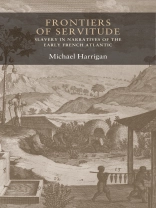Frontiers of servitude explores the fundamental ideas behind early French thinking about Atlantic slavery in little-examined printed and archival sources, focusing on what ‘made’ a slave, what was unique about Caribbean labour, and what strategic approaches meant in interacting with slaves. From c. 1620 –1750, authoritative discourses were confronted with new social realities, and servitude was accompanied by continuing moral uncertainties. Slavery gave the ownership of labour and even time, but slaves were a troubling presence. Colonists were wary of what slaves knew, and were aware of how imperfect the strategies used to control them were. Commentators were conscious of the fragility of colonial society, with its social and ecological frontiers, its renegade slaves, and its population born to free fathers and slave mothers. This book will interest specialists and more general readers interested in the history and literature of the Atlantic and Caribbean.
İçerik tablosu
Introduction
1. Narrative and servitude
2. Slave economies
3. The labouring body
4. Spheres of knowledge
5. Tensions, order, and the body
6. Society and slaves
Conclusion
Index
Yazar hakkında
Michael Harrigan is a specialist in the history and literature of early modern European initiatives in the Americas, Africa and Asia. His publications include Veiled Encounters: Representing the Orient in 17th-Century French Travel Literature (2008)












